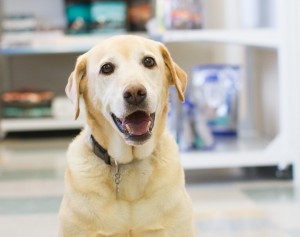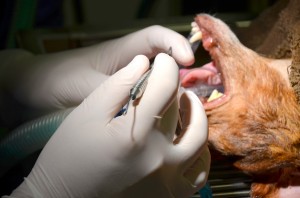
Dental disease is one of the most overlooked problems with dogs and cats. It can be a constant source of pain and infection even though pets often hide their discomfort. Taking care of your dogs’ and cats’ teeth is critical to help them live long and healthy lives. Bacteria in pets’ mouths quickly build up to form plaque, tartar, gingivitis, and ultimately serious periodontitis. If left unrecognized and untreated, this can cause permanent damage to your pet’s mouth and other organs, including the heart, liver, and kidneys. Preventing and treating dental disease is a multi-step process involving effective homecare to prevent disease from forming, but also involves professional dental cleaning by a veterinarian. This effectively removes dental tartar, treats periodontal disease and is critical to help identify and treat dental problems. Pet teeth cleaning services should be scheduled roughly once yearly for most dogs and cats, depending upon the age, breed, and health condition of your pet.
At Leander Veterinary Clinic, we pride ourselves on offering the highest level of pet dental care available, including the safest anesthesia protocols, ultrasonic dental cleaning, digital dental xray (radiography), and even restorative dentistry. Dr. Sam Morehead has undergone advanced dental training, beyond what is found at most veterinary hospitals. Our specially trained team is ready to help you with your pet’s dental needs from advanced dental surgery to practical homecare.
If your dog or cat is experiencing bad breath, excessive drooling, red or swollen gums, misaligned teeth, or bumps or growths inside the mouth, you should contact us at Leander Veterinary Clinic to schedule a dental cleaning appointment.
Reasons to take care of your pet’s teeth.It hurts! Dental disease is painful. Even if your pet many not tell you anything is wrong, and may eat ok, that doesn’t mean they aren’t experiencing pain. This is because dogs and cats can be quite stoic about dental pain and usually have a very strong feeding instinct, but as anyone who has had a toothache can tell you, it’s not comfortable.Dental disease is an infection. This has not only serious effects on the mouth, but systemic effects as well, such as kidney disease, heart disease, as well as taxing the immune system. Ultimately, this can shorten a pet’s life significantly.Halitosis, or bad breath. This unpleasant symptom is caused by bacteria in the mouth and often results in harm to the relationship owners have with their pets. No one wants to be close to their pet if the odor from their mouth is overpowering.If left unrecognized and untreated, dental disease often causes irreversible damage.What to Expect With Your Pet’s Dentistry at Leander Vet ClinicBefore you come in for your pet’s dental care, we would like to go over some basic information so you will be better informed about your pet’s needs.
Periodontal therapy is typically composed of 2-4 stages.
- Dental Prophylaxis. This is what most people are referring to with a dental cleaning, or a “dental.” It involves scaling and polishing the teeth, a complete oral exam, and charting of the teeth.
- Periodontal Surgery. This is needed for patients with dental disease that has advanced below the gum line and is affecting the deeper tissue.
- Extraction. This may be necessary for teeth that are fractured, dead, or so diseased that it is impossible to resolve the pain and infection otherwise.
- Home Care. As with people, pets require some form of regular dental care at home to maintain good dental health. We will discuss this with you upon discharge of your pet.
All of these steps, except home care, require general anesthesia. It simply is not possible to clean under the gum line safely or thoroughly without anesthesia. While there is some inherent risk with anesthesia, there are also risks of delaying dental care. It is for this reason that a great deal of effort is made and precautions taken to make anesthesia as safe as possible for your pet.
A little information about the schedule for the day.
We ask that you bring your pet in between 7:30 and 8:30 a.m. the morning of the procedure. Unless specifically instructed to do so by your veterinarian, do not give your pet anything to eat the morning of the dental. Water is OK, though. If your pet has eaten, please let us know.
We will do a physical exam and any pre-anesthetic lab work before your pet’s procedure. If any problems are found, we will call you to discuss them before deciding whether to proceed with the dental. Once your pet is anesthetized, we will clean and polish the teeth and examine the mouth for any problems. At this point dental x-rays may be taken to further evaluate for disease beneath the gum line. If any other problems are identified, we may need to speak with you, either in person or over the phone, about what treatment is necessary. While we try to anticipate any problems requiring treatment prior to the dental cleaning, it simply is not possible to see everything until your pet is anesthetized and the teeth fully cleaned. Please understand that it is very common to identify further problems that may not have been previously apparent.
If additional work is required, we will either revise the estimate you were given before your visit, or prepare you another estimate to address the problems at another date. If we are not completing all of the dental work on the first procedure, it is critical to schedule the next step soon so disease is not allowed to progress further. Our primary concern when formulating a treatment plan for your pet is what is safest and most comfortable for them. We also structure the price of dentistry such that there is usually not a significant difference in cost whether the work is done all at the same time or completed on a follow-up procedure.
After your pet is awake from the anesthesia, we will call you to inform you of how your pet is doing. Generally, we discharge our dental patients between 3:30-5:30 p.m. Upon pickup, please allow a few minutes to discuss what was done, go over any medications, and schedule any follow-up appointments that may be needed. It is typical for your pet to be a little groggy the evening after their procedure. If your pet is not back to normal by the next morning, or is experiencing any adverse symptoms, please let us know right away. We want you to understand your pet’s dental needs and what is being done to help them, so please ASK QUESTIONS.
Dental care for dogs and cats plays an important role in keeping these well-loved pets healthy and happy for many years. While at home teeth cleaning can help, you should still contact us (512-260-0400) to schedule a routine dog teeth and cat teeth cleaning and exam with a professional veterinarian.


